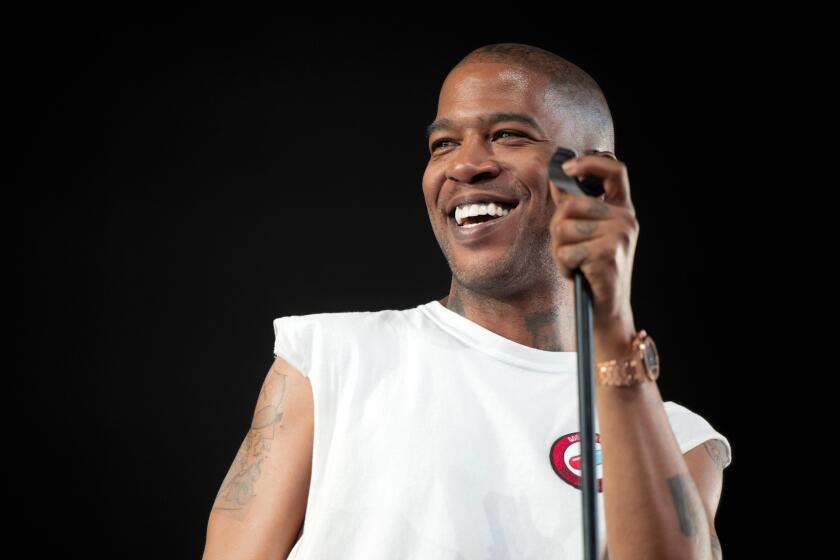John Fullbright aims to connect, uplift with ‘Songs’
Oklahoma singer and songwriter John Fullbright still comes to just one conclusion about his unlikely Grammy Award nomination for his self-released 2012 debut album, “From the Ground Up.”
“I still sort of consider it a mistake,” he said of the nomination in the Americana field alongside heavyweights such as Mumford & Sons, the Lumineers and winner Bonnie Raitt. “But I’m happy they made it.”
The attention that the nod generated for Fullbright, 26, was “a baptism by fire — I hate to use clichés, but that’s absolutely what it was,” he said by phone from his base of operations in Norman, Okla., about an hour’s ride from the even smaller town of Bearden, where he was born.
But Fullbright admits that the Grammy recognition left him “better prepared this time.”
His sophomore album “Songs,” out this week, is already collecting over-the-top accolades. The Wall Street Journal praised the album’s “clarity and simmering intensity” and American Songwriter magazine likens it to Neil Young’s “After the Gold Rush” and Joni Mitchell’s “Blue’ and suggests that “‘Songs’ could take its place in that very same pantheon of hallowed musical masterpieces.”
The simplicity of the album’s title is a harbinger of what it contains — songs impressively and potently economical, mostly stripped to the emotional essence through poetically concise lyrics and heart-rending musical settings.
“Tell me what’s so bad about happy?” he asks in the opening track, “Happy.” In “Keeping Hope Alive,” he triggers a world of emotions in a brief couplet: “Pride and pain/Cloud my brain.” “Until You Were Gone” captures the rude awakening about a romantic parting: “I didn’t know about silence/Until you were gone.”
His songs have earned plaudits from esteemed musicians including Emmylou Harris, Raitt, Rodney Crowell, Mary Gauthier (“He’s so good,” she said on a recent Southland tour stop) and Miranda Lambert.
“I am totally obsessed with John Fullbright right now,” Lambert said in a recent interview about her own forthcoming album. “Leave it to John to come up with a genius title like ‘Songs.’” He also caught the ears of the makers of “August: Osage County,” the 2013 film based on Tracy Letts’ play set in Oklahoma that included his “Gawd Above” on the soundtrack, where he’s in the company of Eric Clapton, Bon Iver, Kings of Leon and Gustavo Santaolalla.
The groundswell of acclaim started modestly in Oklahoma City, when Fullbright began gigging regularly at the Blue Door, a roots-music-minded club run by former music journalist and publicist Greg Johnson, who chiefly wanted to give literate music a forum in the region when he opened it in 1992. Johnson became a vocal champion of Fullbright’s music, became his manager and helped foot the bill for a live album recorded at the club, as well as its successor, “From the Ground Up,” both released on shoestring budgets on the tiny Blue Door Records label he and Fullbright started.
Of the new album’s no-frills title, Fullbright explained, “I’m bad at titling anything. I can’t name a song. I can’t even name a cat. I’m just bad at it. … But it’s a little tongue-in-cheek calling it that. What I’m saying is ‘Cull what you will from these songs, don’t let me steer you in any one direction.’ I want people to come to this with absolutely no expectations and make their own decisions about what it is.”
Much of “Songs” revolves around lost love and the self-recrimination, self-absorption, self-examination and, sometimes, self-absolution that can come in its wake.
For Fullbright, who was classically trained as a pianist through much of his childhood and teen years spent in Okemah, the birthplace of Woody Guthrie, all those reactions are just launch points for his primary goal of relating to anyone who might be listening.
“I’m not going to pull up my diary and start reading passages about all my woes and troubles,” said Fullbright, who will appear at the Grammy Museum in Los Angeles on June 30. “I’d rather that give way to something that somebody is going to connect with, something that pulls them up a bit. The world is full of really sad songs. I love them, and I play them, but I try not to write them anymore.”
“Going Home” sidesteps the finger-pointing that’s all too common in love-gone-wrong songs in Fullbright’s pared-to-the-bone expository, voiced in his pure and gritty tenor: “I met love. Love met me/And we agreed to disagree/The rain stopped falling/I’m coming home.”
In “Happy,” it’s reconciliation, not retribution, he’s after when he sings: “I don’t want to have another friend/I don’t want to wonder how your life has been/I just want to set things straight/Apologize to you and somebody/Tell me what’s so bad about happy?”
“If I’m really blue or in a really tough spot,” he said, “I tend to write my happiest songs, ‘Happy’ being a good example. ‘Moving,’ the song from the last record, I remember writing that from not the brightest place. That’s where I go. That’s what music is to me, that’s what it’s for.”
Songwriting, he said, “is such a strange mix of ego and the lack thereof. That’s the real fine line. You can learn the craft, and master it, but in the end it’s about learning about yourself, your mistakes, your limitations. Then the impossible task is trying to make everybody else feel that way too.
“That’s the part — that’s where your philosophy comes out about the way people work, the way things are or aren’t, or the way they could or should be.
“There’s so much in a little song, there’s such big things in these little four-minute songs,” he said. “It’s my favorite medium for sure.”
More to Read
The biggest entertainment stories
Get our big stories about Hollywood, film, television, music, arts, culture and more right in your inbox as soon as they publish.
You may occasionally receive promotional content from the Los Angeles Times.







